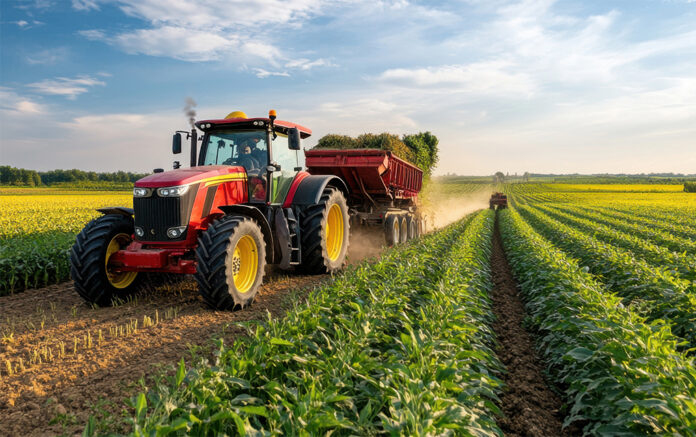A group of agricultural economists, environmental scientists, and policy experts has outlined a plan for achieving carbon-neutral farming by expanding policies that support low-carbon biofuels for transport and aviation.
In a recent Science paper, they suggest new policies to reward farmers who use “climate-smart” methods for growing biofuel crops and to remove barriers that hinder these practices.
These climate-smart methods include:
- Increasing soil carbon through cover crops, no-till farming, and adding biochar or crushed silicate rock.
- Lowering emissions during crop production by optimising fertiliser use, electrifying farm equipment, and improving crop genetics.
If adopted globally, studies show that “climate-smart” farming practices could reduce carbon emissions by 4-8 billion tonnes per year, the researchers wrote. To put that in perspective, in 2024, global carbon dioxide emissions reached an all-time high of about 40 billion tonnes.
“Biofuel markets can be a pathway to decarbonise agriculture as a whole,” said Madhu Khanna, a professor of agricultural and consumer economics at the University of Illinois Urbana-Champaign and lead author of the new report. Khanna is the director of the Institute for Sustainability, Energy and Environment and a researcher in the Centre for Advanced Bioenergy and Bioproducts Innovation, funded by the U.S. Department of Energy, at the University of Illinois.
Farmers not rewarded
“Currently, our biofuel policies don’t reward farmers for adopting climate-smart practices,” Khanna said. “For example, they treat all corn grown for the corn-ethanol market the same, whether or not the farmers adopt those types of practices. By accounting for differences in practices implemented at the farm level and paying a premium for corn grown with climate-smart practices for corn ethanol, biofuel policies can incentivise adoption of these practices.”
Biofuel markets have already established mechanisms for accounting for the carbon intensity of different feedstock types and have well-developed channels for transferring payments from energy markets to biofuel producers, the researchers report. This opens the door to using these channels to expand performance-based incentives to increase the adoption of climate-smart practices in agriculture.
“For example, the ‘40B’ Sustainable Aviation Fuel tax credit of 2023-2024 was designed to differentiate the credit based on the climate-smart practices adopted while producing the crop,” Khanna said. “The lower the carbon intensity, the higher the tax credit paid for sustainable aviation fuels and for the crop used to produce it.”
At present, however, the channels for crediting farmers for soil-carbon sequestration or other climate-friendly practices on the farm are segregated from the markets that provide credits for low-carbon biofuels, Khanna said.
To be compensated for their sustainability efforts in growing the crops, farmers must either enrol in a conservation program or sell carbon credits to one of several companies specialising in agricultural carbon offsets. Space is limited in government conservation programs, however, and farmers must prove that they aren’t already engaging in climate-smart practices to obtain credits. This requires a lot of extra effort on the farmer’s part.
“It also means that early adopters get penalised,” Khanna said
Market merger proposed
Khanna and her colleagues propose an approach for merging the biofuel feedstock market and climate-offset market into a single channel to reward farmers and others in the biofuel supply chain who use practices that lower the carbon intensity of their operations. This approach could subsequently be broadened to reward farmers for adopting climate-smart practices for crops to supply food and feed markets as well.
Like existing policies, any new approach would require verification that farmers are actually implementing the practices they’ve pledged to follow.
“Emerging digital technologies and modelling advances can document farming practices and accurately calculate their carbon intensity. This can simplify and scale this process,” said Bruno Basso, a co-author of the study and an expert in modelling and digital agriculture at Michigan State University. Certification programs could allow independent verification that feedstocks were sustainably produced.
Calculating the changes in the amount of carbon sequestered in crop soils precisely each year is a more daunting task, the authors wrote. But “using multiple process-based ecosystem models can reduce the uncertainty in these estimates and avoid the need for labour-intensive soil sampling procedures,” Basso added.
Another concern is the chance that farmers will implement and then abandon various climate-smart practices, Khanna said.
Designer incentives
“If they do it one year and not the next, they’ll sequester the carbon and then, perhaps, release it back to the atmosphere the following year,” she said. “But we can design incentives for longer-term soil-carbon sequestration by having farmers sign longer-term contracts. This would relate the size of the payments to how long the farmer agrees to keep that carbon in the ground.”
Khanna acknowledges that the carbon benefits from existing biofuels are controversial. Some critics argue that devoting farmland to the production of plant-based fuels takes up land that can be used for food crops and can contribute to the conversion of forests to cropland in other parts of the world, erasing its sustainability gains.
However, current approaches may be underestimating or overestimating the carbon benefits of biofuels by neglecting the carbon impacts of crop management practices on the farm that produces the crop for the biofuel market.
“By developing a market for agricultural products that accounts for all the direct and indirect carbon emission effects from the farm to the consumer, we can better address these concerns,” she said.
“The main premise of our proposal is that we need to have a full and accurate assessment of carbon emissions from the beginning to the end of any product’s life cycle. And right now, the way that biofuel policies are designed, they treat crop producers supplying crops for biofuel as all being the same.”
NOTE: The U.S. Department of Agriculture, U.S. Department of Energy and National Science Foundation supported this work. Khanna is also an affiliate of the Carl R. Woese Institute for Genomic Biology and the National Centre for Supercomputing Applications at the U. of I.





